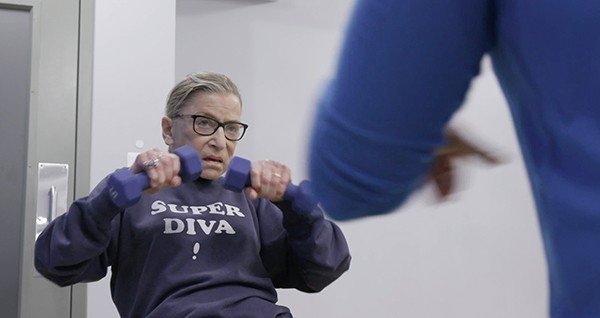Support Us
Houston's independent source of
local news and culture
account
- Welcome,
Insider - Login
- My Account
- My Newsletters
- Contribute
- Contact Us
Documentary About Ruth Bader Ginsberg RBG Is Heaven-(Dis)sent

Screencap from RBG
[
{
"name": "Related Stories / Support Us Combo",
"component": "11591218",
"insertPoint": "4",
"requiredCountToDisplay": "4"
},{
"name": "Air - Billboard - Inline Content",
"component": "11591214",
"insertPoint": "2/3",
"requiredCountToDisplay": "7"
},{
"name": "R1 - Beta - Mobile Only",
"component": "12287027",
"insertPoint": "8",
"requiredCountToDisplay": "8"
},{
"name": "Air - MediumRectangle - Inline Content - Mobile Display Size 2",
"component": "11591215",
"insertPoint": "12",
"requiredCountToDisplay": "12"
},{
"name": "Air - MediumRectangle - Inline Content - Mobile Display Size 2",
"component": "11591215",
"insertPoint": "4th",
"startingPoint": "16",
"requiredCountToDisplay": "12"
}
,{
"name": "RevContent - In Article",
"component": "12527128",
"insertPoint": "3/5",
"requiredCountToDisplay": "5"
}
]
Justice Ruth Bader Ginsburg is a remarkable woman in so many different ways that chronicling her life seems almost impossible, though directors Julie Cohen and Betsy West certainly give it the best shot anyone could in RBG. It is a conventional documentary about a very unconventional subject.
The film follows Ginsburg from her early days as a pioneering lawyer representing the in-roads women were making into the professional world up until the present-day where she has become a pop culture icon. What sets the film apart, though, is the incredible heart of Ginsburg herself and the sobering reminder of just how far as a country we both have and have not come.
To chart Ginsburg as Cohen and West do is to chart the role of gender in society. She has always been in the minority as both lawyer and judge, and many of the cases that she took reflect that. The film touches on highlights such as her battle against discrimination of women in the U.S. Air Force and men in social security survivor benefits. All of it is delivered in the same reserved tone that the Notorious One is known for despite her mockingjay status.
The first half of the film is an unabashed joy because it is a tale of near-universal victories. Ginsburg wins virtually every battle and strikes blows for justice. Her beloved and supportive husband Marty grows deathly ill but recovers. Her age makes her an unlikely candidate for the high court, but her charm and intelligence win over President Clinton to secure the nomination. It’s a unicorn cake of progress and human triumph that could melt the warmest heart.
The second half of the film, though, is something else. In many ways, it’s almost a different film. The fairly centrist Ginsburg is pushed further and further left as the world changes thanks to the Bush-era appointees on the court. Suddenly, the champion fighter known for winning new freedoms is dissenting against her colleagues as things like the Voting Rights Act are declawed. This reaches a sharp peak in her famous denunciation of then-candidate Donald Trump, a rare thing for a judge of her caliber to say and something she later apologized for.
This is tempered with the memetic joy of the Notorious RBG phenomenon, but the general tone is fairly grim at first blush. The modern Ginsburg is in many ways fighting the same battles she started with, and that’s a little depressing.
What saves it is the fact that film so poignantly shows the impact that Ginsburg’s work has had on people. Women line up to see her and hear her speak and people tattoo her face on their arms. Maybe nothing shows it better than Ginsburg at the Virginia Military Institute 20 years after a decision she read that ended their gender discrimination policy speaking to a mixed-gender audience of young people who clearly know about de facto legal gender discrimination as something of a fairy tale.
Ultimately, that’s the message of the film and why it’s a must-see. There is still much ground to cover in creating a gender-equal America because forces are always in the corner training to take back ground against justice. Ginsburg emerges from RBG as a saint of change in the face of a world that often doesn’t even want to acknowledge the situation people seek to alter. It’s quiet, strong, and unforgettable, just like the woman herself.
RBG opens at Alamo Drafthouse on Friday, May 18

